12 Top AI Tools for Business to Boost Efficiency in 2025
Discover the top AI tools for business in 2025. Our curated list covers platforms for automation, strategy, and productivity to drive growth.

The landscape of business is rapidly evolving, and at the heart of this transformation is Artificial Intelligence. Choosing the right tools is no longer a luxury but a strategic necessity for staying competitive. This guide cuts through the noise, presenting a curated list of the top AI tools for business that can genuinely drive efficiency, automate complex processes, and unlock new growth opportunities. We'll move beyond generic feature lists to provide practical implementation guidance and honest assessments of each platform's limitations, complete with screenshots and direct links to help you make informed decisions.
However, selecting a tool is only the first step. True success comes from a coherent strategy that aligns technology with your core objectives. Services like Ekipa’s AI co creation and AI strategy consulting are essential for integrating these powerful platforms effectively. From automating marketing workflows to streamlining internal operations, the potential applications are vast. For a focused look at how AI impacts a specific department, you can explore specialized resources like the 12 Best AI SEO Tools to Dominate Search.
This article will serve as your comprehensive resource, detailing the platforms that will define business operations in 2025 and beyond. Let's explore the tools that will empower your team.
1. Custom ChatGPT — Internal AI Knowledge Assistant
For businesses looking to harness AI for internal efficiency, Custom ChatGPT by Ekipa AI represents a premier solution. It transforms your private company documentation, such as HR handbooks, IT support guides, and operational manuals, into an interactive, secure knowledge base. This tool empowers employees to get instant, accurate answers to their role-specific questions, effectively creating a dedicated expert for every department. By doing so, it dramatically reduces the time spent searching for information and frees up support teams to focus on more complex issues.
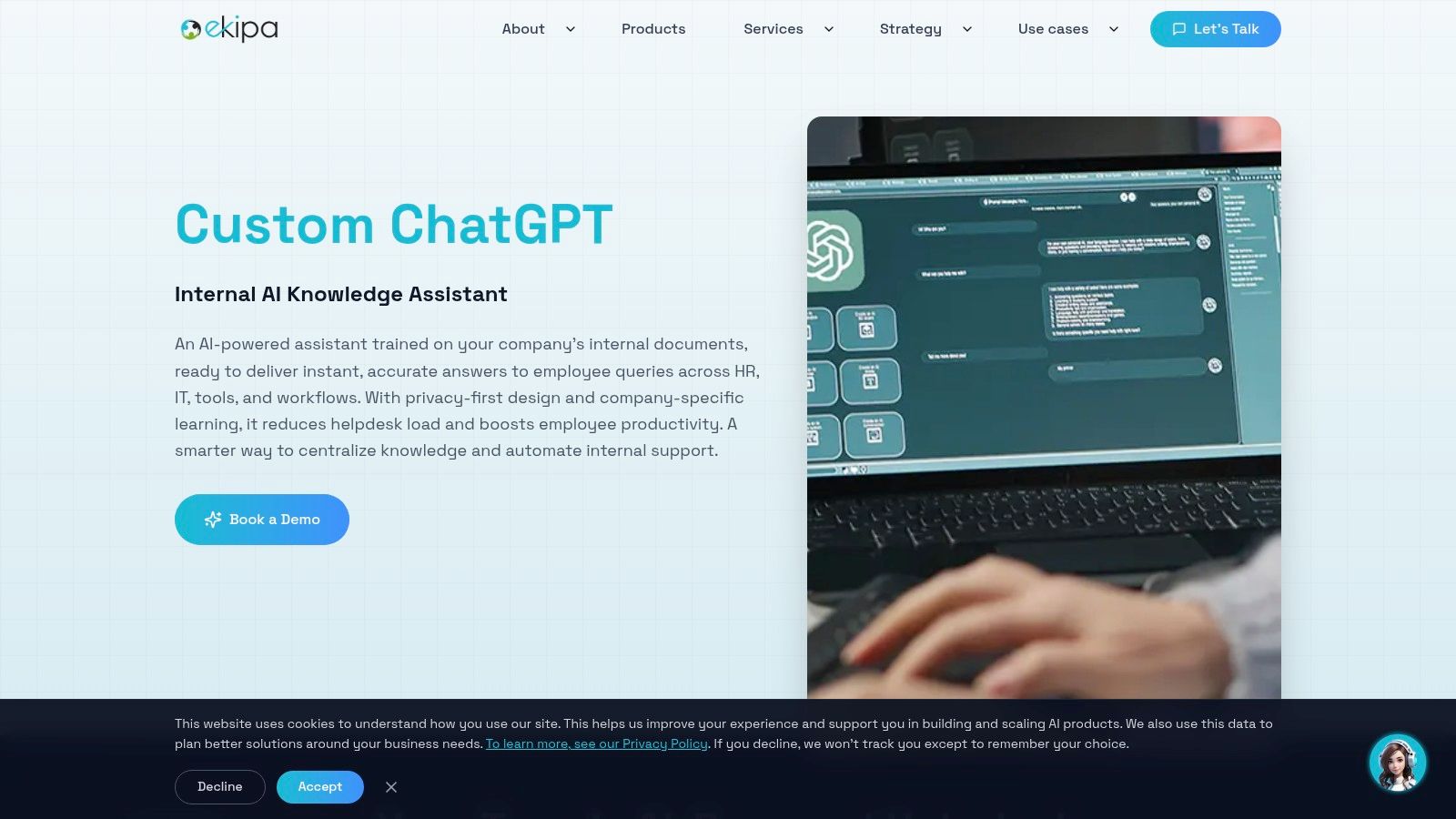
What sets this platform apart is its focus on creating a secure, contextualized environment that understands your unique business language and procedures. Unlike general-purpose AI models, this assistant is fine-tuned on your enterprise-specific data, ensuring responses are not only precise but also compliant with internal policies. This tailored approach makes it one of the top AI tools for business seeking to boost productivity and streamline internal communications. The rapid deployment, guided by Ekipa's expertise in AI strategy consulting, ensures a swift return on investment.
Key Strengths and Use Cases
- Instantaneous Support: Provides immediate answers to common employee queries, such as "What is our policy on remote work?" or "How do I reset my software license?"
- Onboarding and Training: New hires can quickly get up to speed by asking the AI about company processes, tools, and cultural norms, accelerating their integration.
- Operational Efficiency: Operations teams can query the system for standard operating procedures (SOPs), reducing errors and ensuring consistency across tasks.
- Data Security: All interactions occur within a private, controlled environment, safeguarding sensitive company information from external exposure.
While the system's effectiveness is contingent on the quality of the source documentation, its ability to centralize and activate dormant knowledge is a significant competitive advantage. Learn more about the Custom ChatGPT — Internal AI Knowledge Assistant on ekipa.ai to see how it can be implemented in your organization.
2. AWS Marketplace — AI/ML category
For businesses deeply integrated into the Amazon Web Services ecosystem, the AWS Marketplace is an essential destination for sourcing enterprise-grade AI and machine learning solutions. Rather than a single tool, it’s a vast, curated catalog of deployable software and pre-trained models. This platform streamlines procurement and governance, making it one of the top AI tools for business teams that prioritize security and scalability within their existing cloud infrastructure.
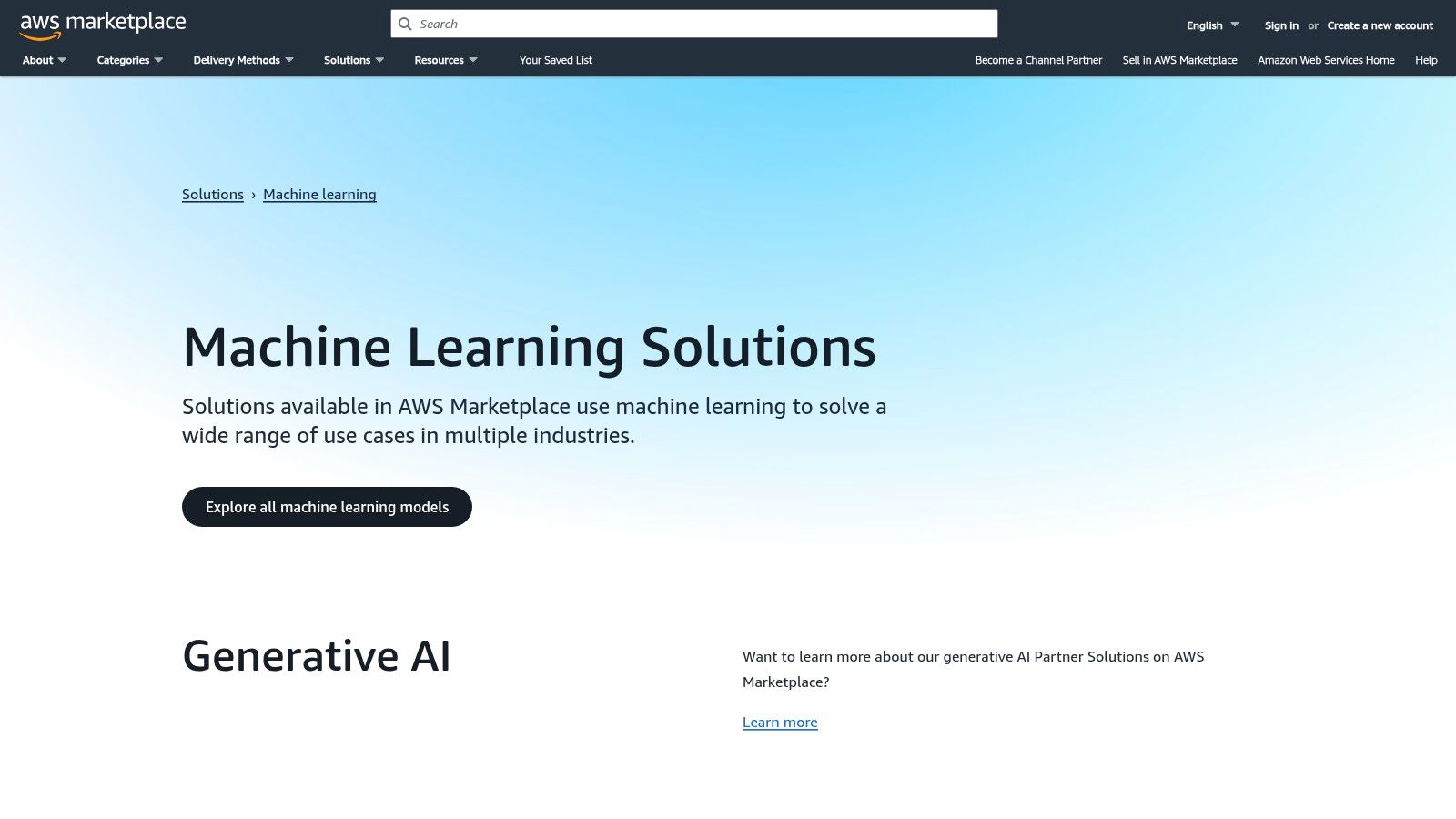
The primary advantage is its direct integration with AWS SageMaker, which allows technical teams to deploy sophisticated models with just a few clicks. The marketplace simplifies vendor management by consolidating billing through your existing AWS account. Its unique value lies in providing a secure and governed environment for IT-led AI adoption, a crucial component of a successful AI Automation as a Service strategy.
Use Cases & Implementation
- Rapid Prototyping: Deploy a pre-trained model for sentiment analysis or object detection to quickly test a new product feature.
- Specialized Industry Solutions: Find models trained on specific datasets for industries like finance or healthcare.
- Simplified Procurement: Purchase and deploy third-party AI software with unified billing and AWS-native controls.
While powerful, it’s best suited for organizations with AWS expertise, as managing deployed models requires cloud infrastructure knowledge. It may not be the ideal choice for businesses pursuing a multi-cloud strategy or those without dedicated technical teams.
Website: https://aws.amazon.com/marketplace/solutions/machine-learning
3. Microsoft Azure Marketplace — AI + Machine Learning
For enterprises committed to the Microsoft ecosystem, the Azure Marketplace serves as a centralized hub for discovering, purchasing, and deploying a wide range of AI and machine learning applications. It functions as a curated digital storefront, offering everything from Generative AI models and MLOps platforms to industry-specific solutions. This makes it one of the top AI tools for business leaders seeking to leverage AI within their existing Azure cloud environment, ensuring seamless integration and governance.
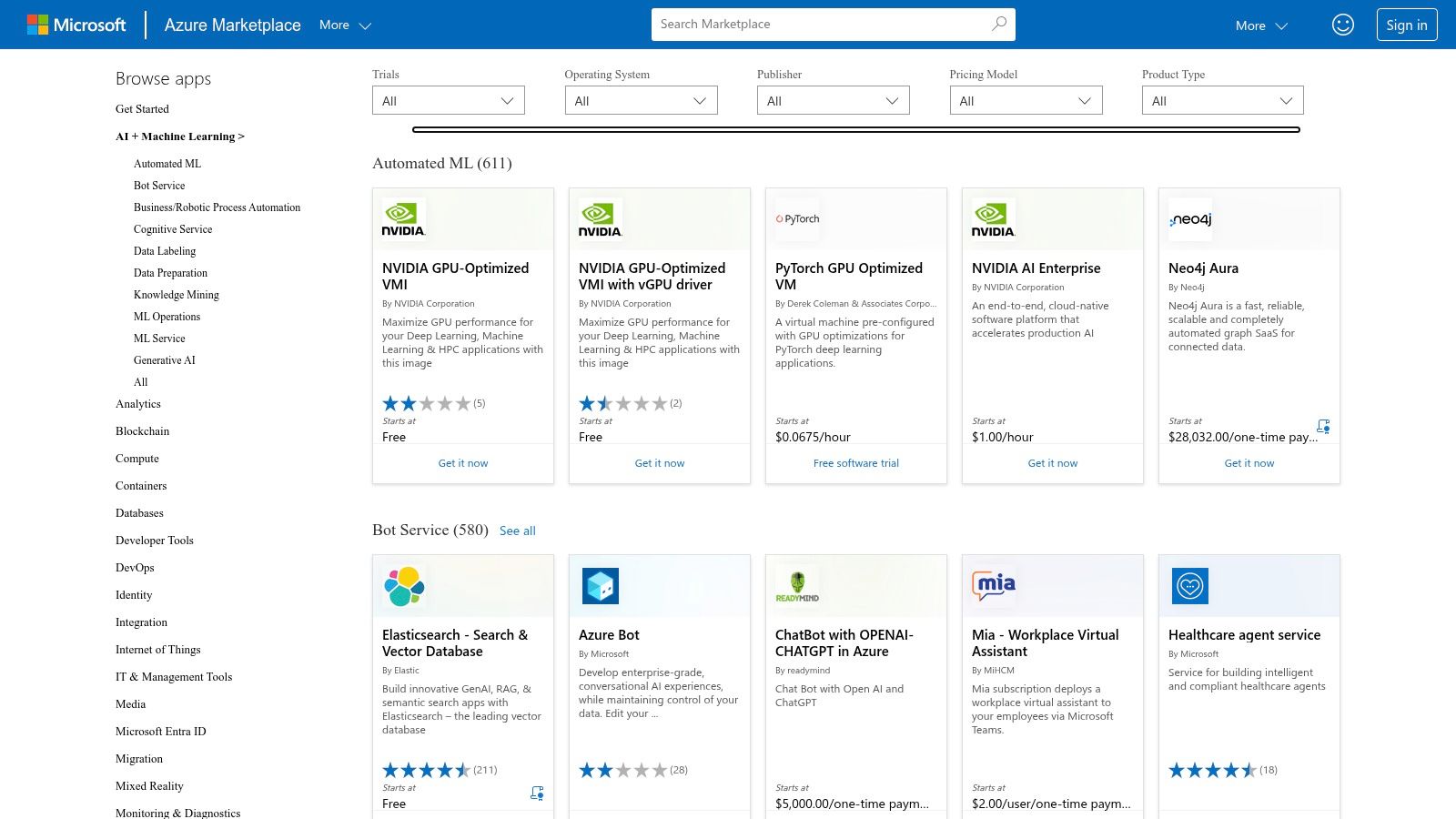
Its primary strength lies in its tight integration with core Azure services like Azure Machine Learning and Azure OpenAI. This allows organizations to procure and deploy third-party AI solutions that natively connect with their existing data and security frameworks, including Entra ID. The marketplace accelerates innovation by simplifying the vendor management process through unified Azure billing and providing a secure platform for IT-approved AI adoption, a key part of any robust AI strategy consulting initiative.
Use Cases & Implementation
- Extend Microsoft 365: Find AI-powered add-ins and applications that integrate directly into Teams, Outlook, and other Office apps.
- Access Specialized Models: Deploy partner-developed models for tasks like document intelligence or predictive maintenance via solution templates.
- Streamline MLOps: Purchase and deploy end-to-end MLOps platforms to manage the entire machine learning lifecycle on Azure.
While incredibly powerful for Azure-centric organizations, its value diminishes for businesses operating in multi-cloud or non-Microsoft environments. Some advanced solutions may also require significant technical expertise to configure and manage effectively, underscoring the need for careful planning.
Website: https://azuremarketplace.microsoft.com/en/marketplace/apps/category/ai-plus-machine-learning
4. Google Cloud Marketplace — AI models and Vertex AI Model Garden
For organizations operating within the Google Cloud ecosystem, the Google Cloud Marketplace serves as a centralized hub for discovering and deploying a wide range of first-party and third-party AI models. It is a powerful catalog that integrates directly with Vertex AI's Model Garden, allowing teams to manage the entire model lifecycle from procurement to deployment in a unified environment. This makes it one of the top AI tools for business teams that want to leverage Google's robust infrastructure and streamline vendor management.
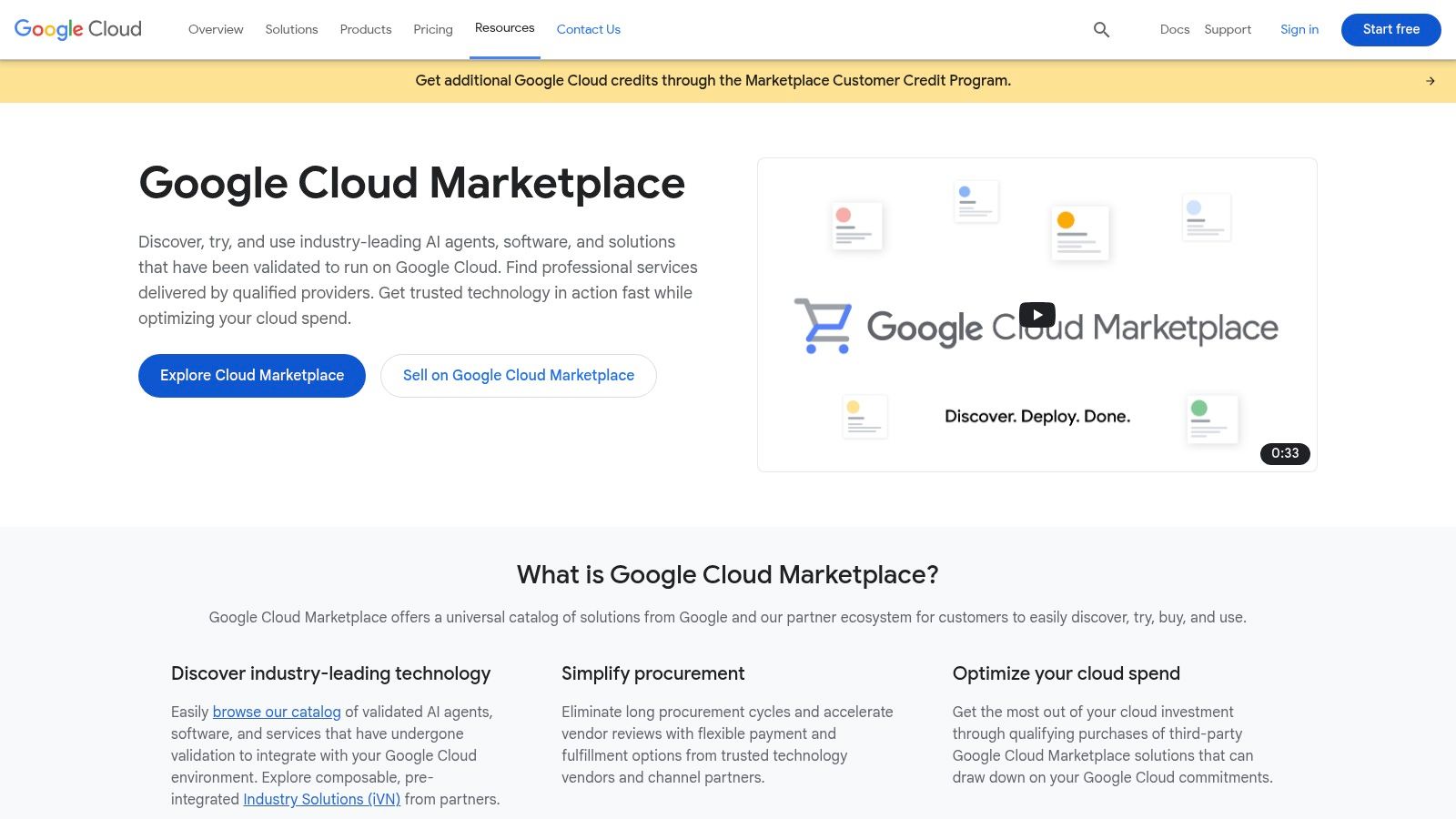
The platform's key advantage is its seamless workflow. Users can discover a model on the marketplace, enable it with a few clicks, and immediately begin managing it within Vertex AI. This tight integration simplifies the process of experimentation and deployment. Furthermore, Google often provides initial credits for new customers, lowering the barrier to entry for trying out sophisticated, enterprise-ready models and integrating them into a broader AI Automation as a Service plan.
Use Cases & Implementation
- Access Foundational Models: Deploy powerful Google models like Gemini or find specialized third-party solutions for niche tasks.
- Unified Billing: Consolidate all AI model and software costs through your existing Google Cloud billing account.
- Streamlined Model Management: Use Vertex AI to tune, deploy, and monitor models procured from the marketplace.
The main prerequisite is a properly configured Google Cloud project with the necessary IAM permissions, which requires technical expertise. Businesses committed to a multi-cloud strategy may find it restrictive, as it locks procurement into the Google Cloud ecosystem, requiring parallel solutions for other cloud providers.
Website: https://cloud.google.com/marketplace
5. Microsoft AppSource — AI + Machine Learning apps for business users
For organizations embedded in the Microsoft ecosystem, AppSource is the go-to marketplace for line-of-business AI applications. Unlike the more developer-focused Azure Marketplace, AppSource provides business-ready AI tools that integrate directly into Microsoft 365, Dynamics 365, and the Power Platform. This focus on seamless integration makes it one of the top AI tools for business users looking to enhance existing workflows without extensive technical overhead.
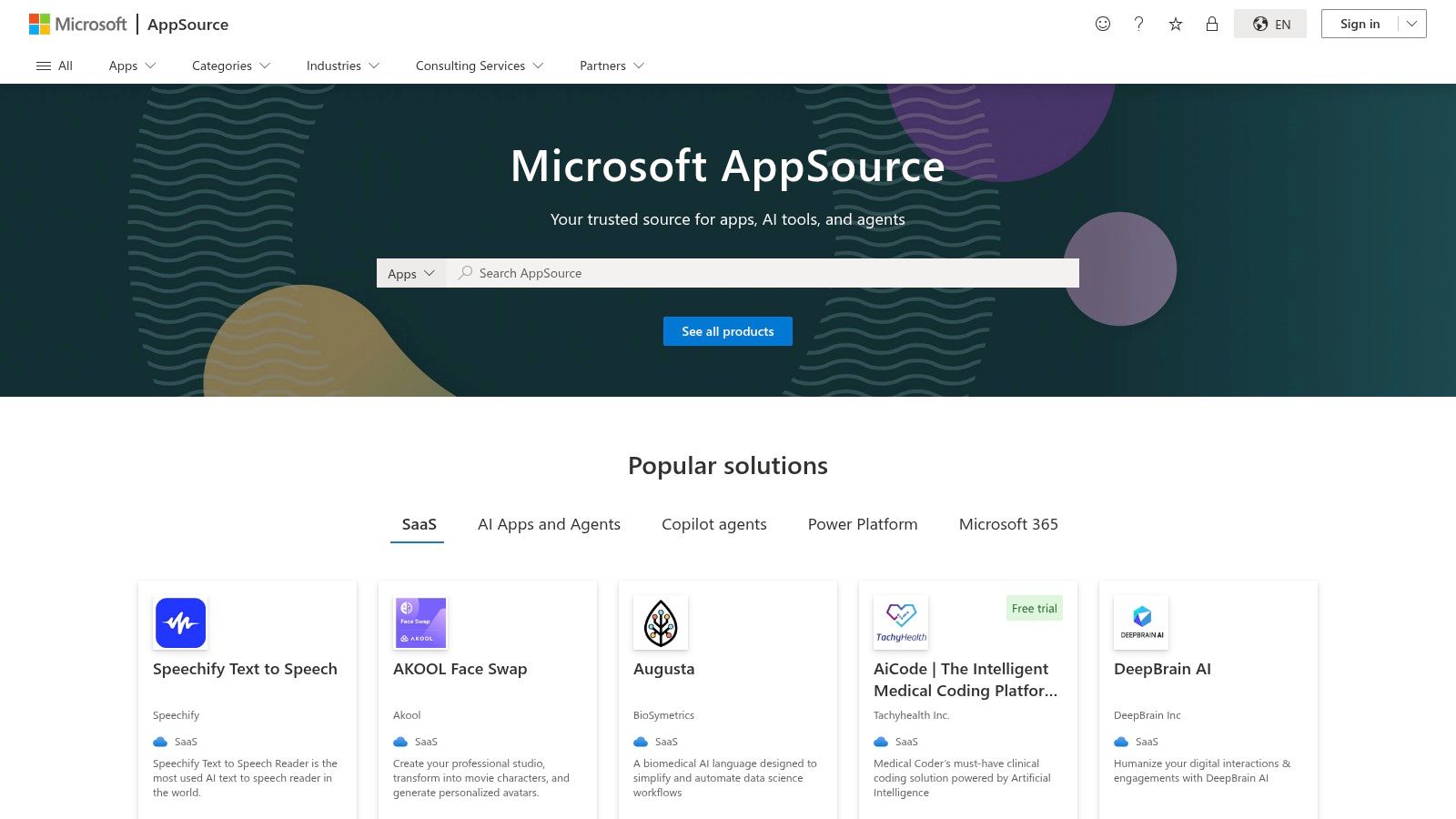
The platform's strength is its user-friendly approach. Business leaders can easily find, trial, and deploy AI-powered add-ins for applications like Teams or Power BI with a simple 'Get it now' process. This accessibility dramatically lowers the barrier to entry for AI adoption, allowing teams to quickly leverage specialized solutions for sales forecasting, customer service automation, or data analytics. It empowers business units to drive their own AI initiatives within a governed Microsoft environment.
Use Cases & Implementation
- Enhancing Business Applications: Add an AI-powered sales forecasting tool directly into Dynamics 365 or a sentiment analysis app into Microsoft Teams.
- Low-Code AI Solutions: Discover Power Platform connectors that bring machine learning capabilities to citizen developers.
- Industry-Specific Functionality: Find vetted applications for specific verticals like retail, manufacturing, or financial services.
While AppSource excels at providing accessible, integrated tools, the quality and security of third-party apps can vary, requiring careful vendor vetting. It is less suited for teams needing fundamental data science tools or deep model customization, which are better served by the Azure Marketplace.
Website: https://appsource.microsoft.com/en-us/home?category=ai-machine-learning
6. G2 — Best AI Software (buyer reviews and rankings)
For businesses navigating the crowded AI software market, G2 serves as an indispensable research hub. Instead of being a tool itself, it is one of the largest software review marketplaces, offering live rankings, verified peer reviews, and detailed comparisons. This platform is crucial for vetting vendors and shortlisting the best-fit solutions before making a significant investment, making it one of the top AI tools for business leaders focused on due diligence and risk mitigation.
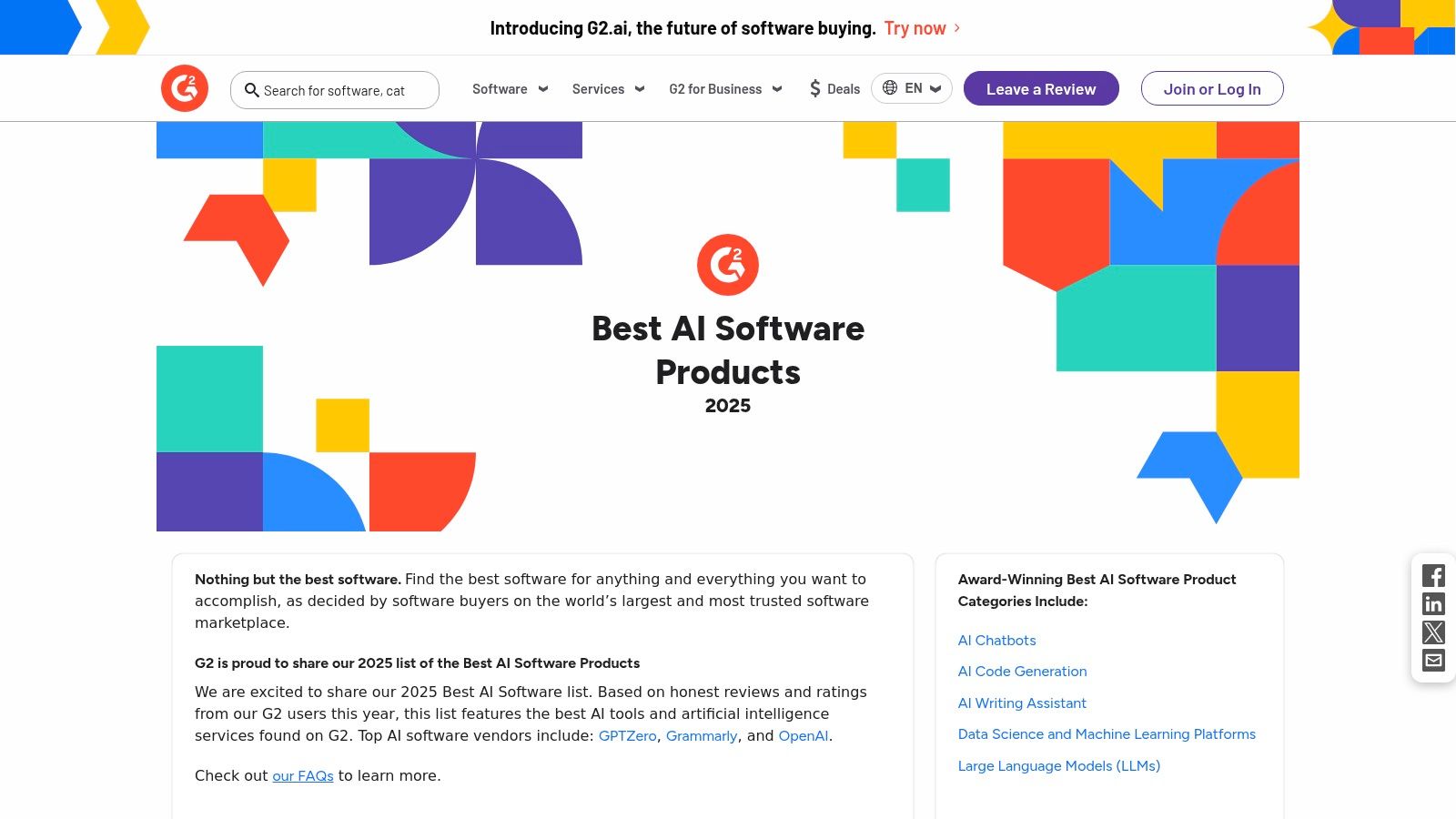
The primary advantage of G2 is the wealth of authentic user feedback, which provides unfiltered insights into a product's real-world performance, implementation challenges, and support quality. With over 3,000 AI products listed, its robust filtering allows decision-makers to narrow down options by company size, industry, and specific features. This peer-driven validation is a critical step in building a confident AI Automation as a Service procurement process.
Use Cases & Implementation
- Vendor Vetting: Compare satisfaction scores and read in-depth reviews to validate a vendor's marketing claims.
- Feature Comparison: Use side-by-side comparisons to see how a tool's capabilities stack up against direct competitors.
- Shortlist Creation: Filter the extensive AI category to build a manageable list of potential solutions for further evaluation.
While invaluable for research, remember that some vendors use sponsored placements to increase visibility. It’s also not a transactional platform, you must go to the vendor's site to purchase. It’s best used as a critical first step in the procurement workflow, not the final one.
Website: https://www.g2.com/best-software-companies/top-ai
7. Capterra — Artificial Intelligence Software directory
For small to mid-market businesses navigating the crowded AI landscape, Capterra’s directory offers a structured starting point for software discovery. As a long-standing software review platform, it aggregates over 1,000 AI tools, allowing buyers to filter and compare options based on features, pricing models, and verified user reviews. This makes it one of the top AI tools for business leaders who need to create a shortlist and gather initial market intelligence without extensive preliminary research.
The primary benefit of Capterra is its user-driven review system and transparent filtering options, which help demystify the selection process. Users can sort by "Highest Rated" or "Most Reviews" to quickly identify popular and well-regarded solutions. Its value lies in providing a broad, comparative view of the market, which is a critical first step before engaging in a more detailed AI requirements analysis or vendor negotiation.
Use Cases & Implementation
- Initial Vendor Discovery: Quickly generate a list of potential AI software vendors for a specific business need like CRM or marketing automation.
- Comparative Analysis: Use side-by-side comparison features to evaluate pricing, features, and user sentiment for two or three shortlisted tools.
- Market Research: Understand the feature sets and capabilities common in a specific AI software category before defining project scope.
While excellent for discovery, the directory model means quality can vary, and sponsored listings are prioritized. It's best used for preliminary research; businesses will still need to conduct their own due diligence and validation, especially for complex, enterprise-level deployments.
Website: https://www.capterra.com/artificial-intelligence-software/
8. Product Hunt — Artificial Intelligence topic
For leaders aiming to stay ahead of the innovation curve, Product Hunt's Artificial Intelligence topic is an indispensable daily resource. It’s not a tool itself, but a launchpad where new AI applications are unveiled and vetted by a tech-savvy community. This platform is a goldmine for discovering emerging marketing, content creation, and developer tools, making it one of the top AI tools for business leaders focused on competitive analysis and early adoption.
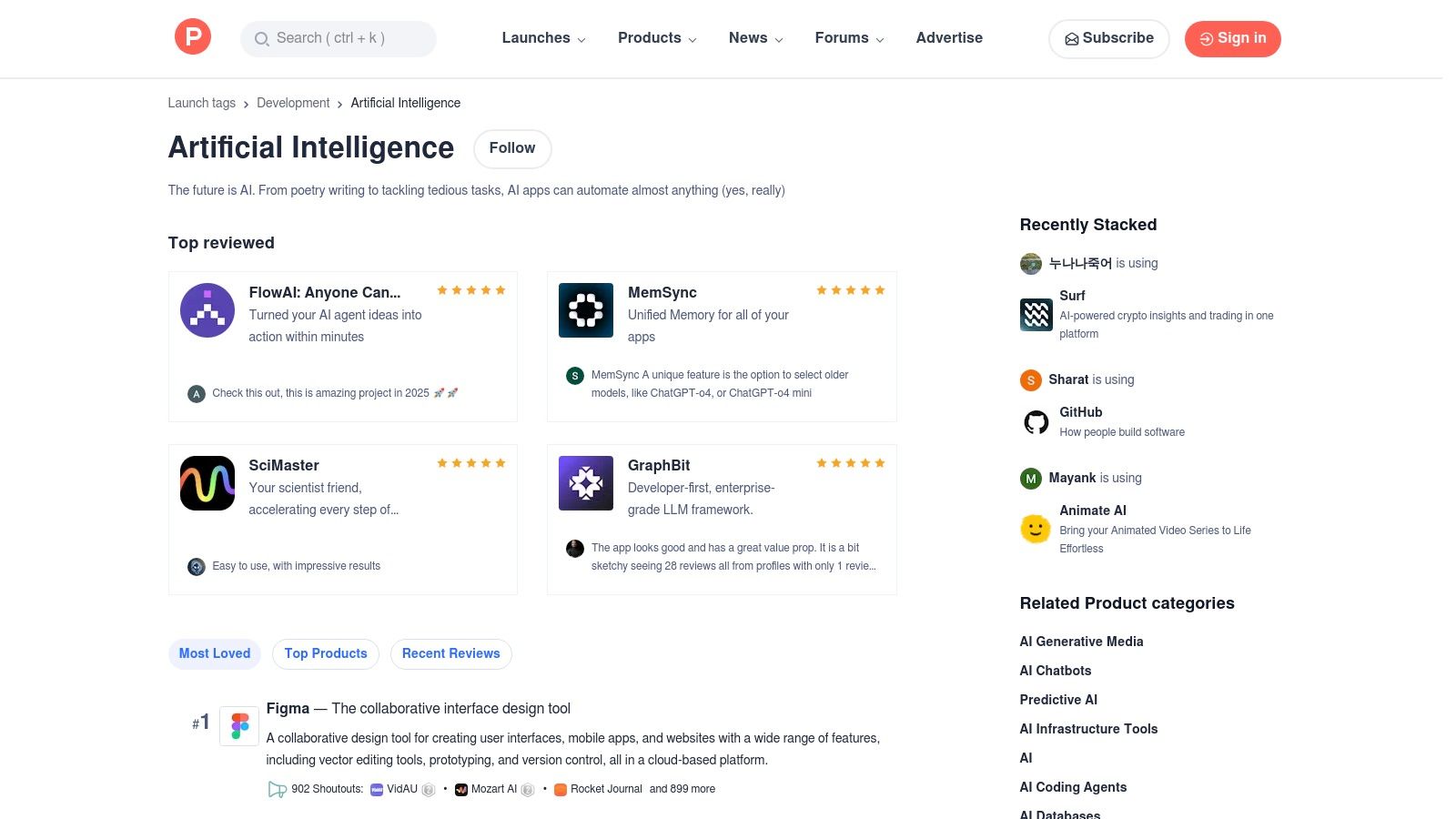
The platform's primary value is its real-time feed of innovation, complete with upvotes, user comments, and direct access to the creators. It provides unfiltered market signals about which new tools are gaining traction, offering vital insights for any AI strategy consulting effort. By monitoring daily launches, businesses can quickly identify novel solutions and potential partners before they become mainstream, spotting trends that could inform their own product development.
Use Cases & Implementation
- Market Research: Monitor daily AI product launches to understand emerging trends and identify new competitors.
- Tool Discovery: Find niche, cutting-edge AI tools for specific tasks like video generation or code completion.
- Inspiration for Innovation: Analyze newly launched products to spark ideas for internal AI projects or features.
While excellent for discovery, Product Hunt's feed can be noisy, and many listed tools are early-stage startups not yet suitable for enterprise deployment. It serves best as a high-level scanning resource, with procurement and vetting happening externally.
Website: https://www.producthunt.com/topics/artificial-intelligence
9. Google Workspace Marketplace — AI add-ons for Docs/Sheets/Slides/Gmail
For businesses operating within the Google ecosystem, the Workspace Marketplace is a goldmine for enhancing productivity with AI. It functions as a secure, admin-controlled app store where teams can discover and install AI-powered add-ons directly into applications like Docs, Sheets, and Gmail. This approach makes it one of the top AI tools for business by seamlessly embedding advanced capabilities into existing workflows, driving high user adoption with minimal friction.
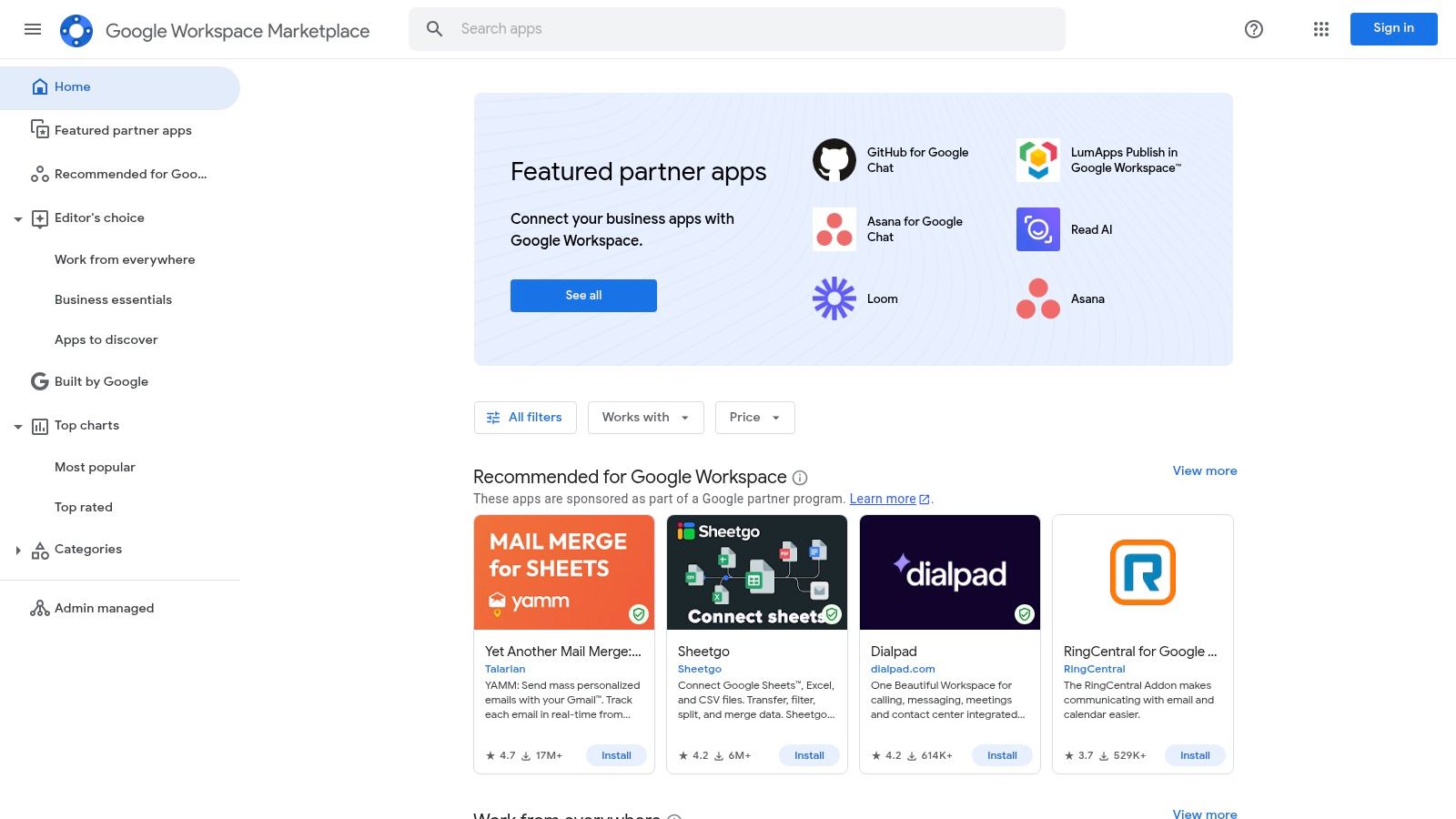
The key benefit is its native integration, which transforms familiar tools into powerful AI assistants. With admin-managed installations and permissions, organizations can maintain governance and security while empowering employees. Its value comes from democratizing AI, allowing non-technical users to leverage sophisticated functions without leaving their primary work environment, which is a core tenet of effective AI Automation as a Service.
Use Cases & Implementation
- Enhanced Content Creation: Install an add-on in Google Docs to assist with writing, editing, or summarizing reports.
- Data Analysis in Sheets: Use an AI tool to automate data cleaning, generate formula suggestions, or create predictive models.
- Email Management in Gmail: Deploy an extension that helps draft replies, summarize long threads, or manage meeting schedules.
While incredibly accessible, the quality and security of add-ons vary. It's crucial for administrators to vet each tool's data handling policies. Additionally, feature availability may depend on your specific Google Workspace plan and Google’s rollout schedule.
Website: https://workspace.google.com/marketplace
10. Salesforce AppExchange — Einstein/AI apps and bots
For businesses built on the Salesforce ecosystem, the AppExchange is the definitive source for AI-powered applications that enhance CRM capabilities. It is a dedicated marketplace featuring AI chatbots, advanced analytics, and automation tools specifically designed to integrate with Sales, Service, and Marketing clouds. The platform's strength lies in providing pre-vetted, secure solutions that leverage your existing customer data, making it one of the top AI tools for business teams aiming to maximize their Salesforce investment.
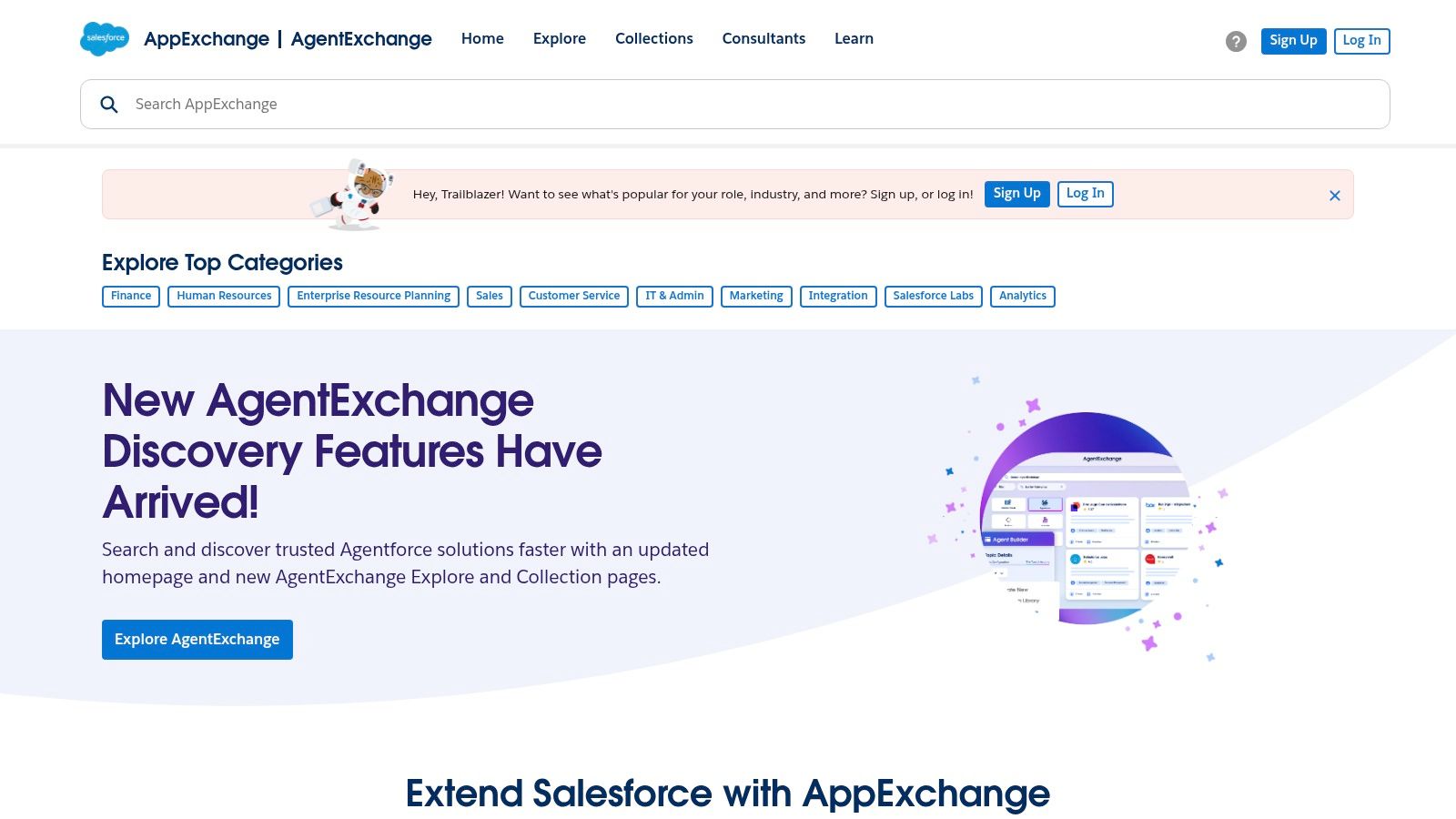
The key advantage is its deep, native integration with Salesforce data, enabling Einstein-powered apps to deliver highly personalized and context-aware insights without complex data migration. It offers a mix of free tools from Salesforce Labs and robust, paid enterprise solutions from third-party vendors. This curated environment ensures that all apps meet Salesforce's security and performance standards, a critical factor when designing an effective AI strategy consulting plan.
Use Cases & Implementation
- Enhanced Customer Service: Deploy an Einstein-powered chatbot to resolve common customer inquiries instantly within Service Cloud.
- Predictive Sales Analytics: Install an app that analyzes sales data to forecast revenue and identify at-risk deals.
- Marketing Automation: Use AI tools to segment audiences, personalize campaigns, and optimize email send times.
While exceptionally powerful, this marketplace is exclusively for Salesforce users. Implementation often requires significant involvement from a Salesforce administrator, and the costs for sophisticated enterprise bots can be substantial. It's best for organizations committed to leveraging their CRM data as a core strategic asset.
Website: https://appexchange.salesforce.com
11. Shopify App Store — AI apps for commerce
For e-commerce businesses operating on Shopify, the platform's App Store is the definitive hub for AI-powered enhancements. It's not a single application but a dedicated marketplace featuring a curated collection of AI tools for everything from customer service chatbots and personalized product recommendations to SEO optimization and ad copy generation. This makes it one of the most practical and top AI tools for business owners focused exclusively on retail and direct-to-consumer sales.
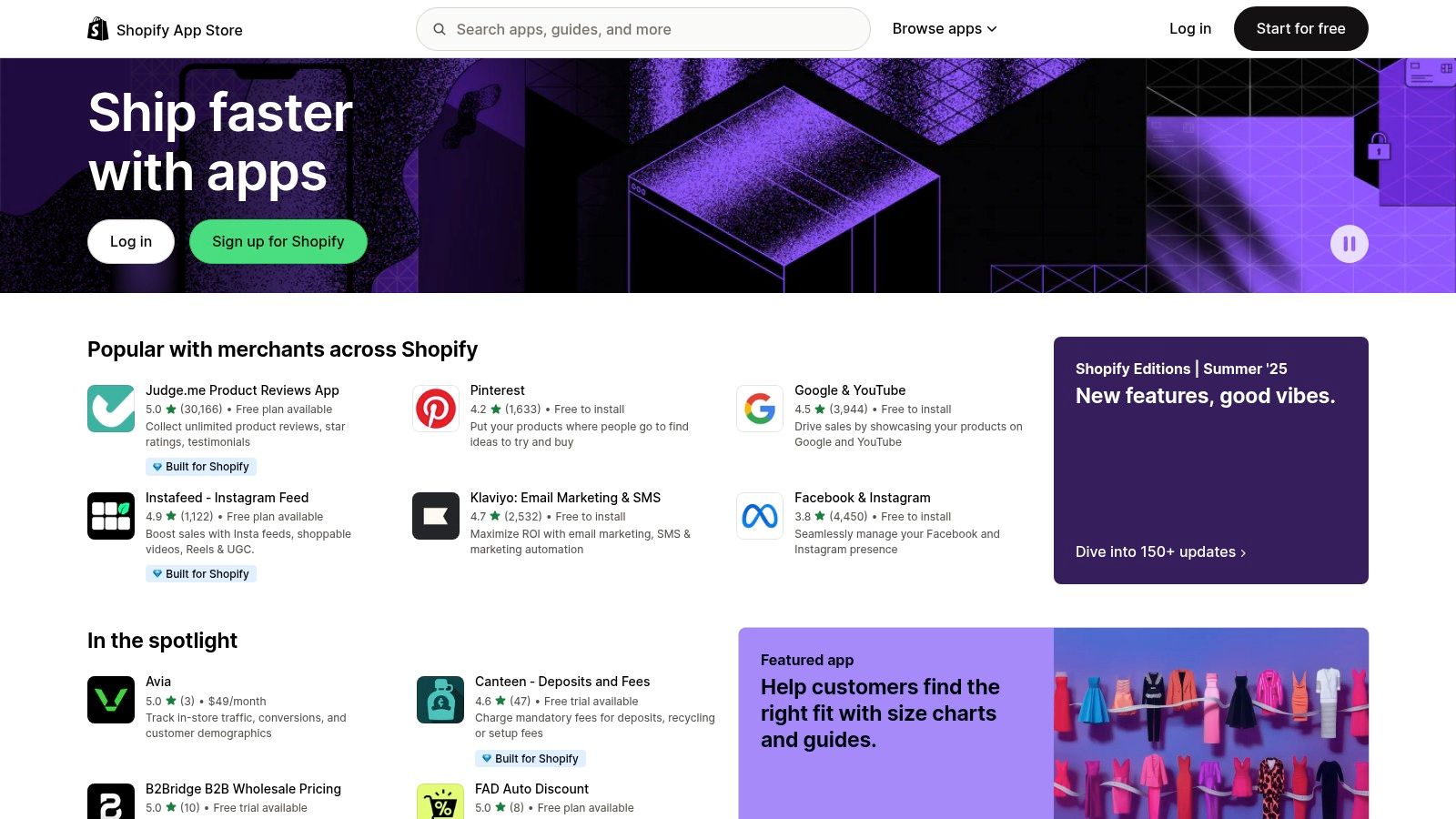
The primary advantage is the seamless integration; apps can be installed and configured in minutes directly within the Shopify dashboard. Its unique value lies in offering merchant-centric AI solutions that directly impact sales and operational efficiency, from merchandising to customer support. Shopify even offers its own suite of tools, like Shopify Magic, to simplify store building and content creation, augmenting the platform's core capabilities with valuable internal tooling.
Use Cases & Implementation
- Enhanced Customer Experience: Deploy AI chatbots to provide 24/7 support and answer common customer queries.
- Personalized Merchandising: Use AI recommendation engines to show shoppers products they are most likely to buy.
- Automated Content Creation: Generate compelling product descriptions, blog posts, and email marketing copy with integrated AI writers.
While incredibly accessible for Shopify merchants, its utility is limited to the e-commerce sector. The quality of third-party apps can also vary, so businesses must carefully evaluate reviews, support options, and data privacy policies before committing.
Website: https://apps.shopify.com
12. Slack App Directory — AI-powered productivity
For businesses that run on Slack, the AI-Powered Productivity category in its App Directory is the central hub for integrating intelligence directly into daily workflows. Instead of being a standalone application, this is a curated marketplace of AI assistants that operate inside the communication platform millions already use. This approach makes it one of the top AI tools for business teams aiming to boost productivity without introducing new software or fragmenting their tech stack.
The key benefit is its native integration. AI tools can summarize channels, draft messages, and search company knowledge bases without users ever leaving Slack, which dramatically increases adoption rates. Its value lies in bringing AI capabilities into the context of conversation and collaboration, turning a communication tool into a command center for an organization's AI Automation as a Service initiatives. The directory also provides clear security information and admin controls for each app.
Use Cases & Implementation
- Meeting & Channel Summaries: Use apps like Slack AI or Asana to get instant summaries of unread messages or meeting discussions.
- Workflow Automation: Connect tools like Zapier or Make to trigger automated actions in other apps based on Slack conversations.
- Instant Knowledge Retrieval: Integrate a bot that connects to your internal wiki or database to answer team questions on the fly.
While incredibly convenient, the functionality is entirely dependent on third-party vendors, so each app requires a careful compliance and security review. Many of the more advanced features also require separate paid subscriptions to the app provider on top of any paid Slack plan.
Website: https://slack.com/apps/category/At06D34LSB9C-ai-powered-productivity
Top 12 AI Business Tools Comparison
| Product | Core Features | User Experience / Quality | Value Proposition | Target Audience | Unique Selling Points | Price Point / Access |
|---|---|---|---|---|---|---|
| Custom ChatGPT — Internal AI Knowledge Assistant | Internal AI assistant, private docs integration | Instant, accurate, secure responses | Rapid AI strategy execution, cost-effective | Enterprises needing internal knowledge AI | Tailored to company data, rapid deployment | Not publicly listed, customizable |
| AWS Marketplace — AI/ML category | Hundreds of SageMaker models & algorithms | Enterprise controls, usage info | Simplifies procurement, direct AWS deploy | AWS users, IT/procurement teams | SageMaker integration, consolidated billing | Pay per use, enterprise pricing |
| Microsoft Azure Marketplace — AI + ML | Generative AI, MLOps, Azure AI | Integrated with MS stack, filters | Broad partner ecosystem, governance | Azure-centric enterprises | Deep Microsoft ecosystem integration | Subscription-based, varies per offer |
| Google Cloud Marketplace — AI models | AI models, Vertex AI Model Garden | Unified procurement & management | Integrated GCP workflow, initial credits | GCP users, AI teams | Vertex AI model lifecycle management | Pay per use, project-based |
| Microsoft AppSource — AI + ML apps | Business AI apps, M365/Dynamics | Easy install, trials available | Business user focus, smooth adoption | Business users, MS 365 users | Line-of-business focused AI apps | Generally free/trial, paid apps vary |
| G2 — Best AI Software (buyer reviews) | AI product reviews & rankings | Real user feedback, wide coverage | Helps vet & shortlist AI vendors | Buyers evaluating AI software | Largest AI review marketplace | Free to browse |
| Capterra — Artificial Intelligence directory | AI software listings & filters | Transparent reviews & moderation | Easy side-by-side comparisons | SMB to mid-market buyers | Longstanding software directory | Free to browse |
| Product Hunt — Artificial Intelligence topic | AI product discovery & community | Ranking, early-stage product focus | Spot innovation early | Innovators, developers, marketers | Daily new AI tools & user feedback | Free to use |
| Google Workspace Marketplace — AI add-ons | AI add-ons for Docs/Sheets/etc | Native integration, admin controls | Enhances Workspace productivity | Google Workspace users | Admin-managed AI extensions | Free/paid add-ons vary |
| Salesforce AppExchange — Einstein/AI apps | AI bots & analytics for Salesforce | Deep CRM integration, secure | Ecosystem-tailored AI solutions | Salesforce customers | Einstein bots & vertical-specific solutions | Free & paid apps |
| Shopify App Store — AI apps for commerce | AI chatbots, SEO, product recs | Fast install, merchant focus | AI to boost retail & DTC brands | Shopify merchants | Commerce-focused AI & Shopify Magic | Paid & free apps |
| Slack App Directory — AI-powered productivity | AI assistants, workflow automation | Integrated in Slack, admin controls | AI enhances Slack workflows & collaboration | Slack users, teams | AI where conversations happen | Mostly free, some paid features |
From Tools to Transformation: Implementing Your AI Strategy
Navigating the expansive landscape of AI tools, from the vast marketplaces of AWS and Microsoft Azure to the specialized app stores of Shopify and Salesforce, can feel overwhelming. This curated list of the top AI tools for business provides a powerful starting point, but the true journey begins not with a purchase, but with a plan. Technology alone doesn't guarantee a competitive advantage; a cohesive AI strategy that aligns these powerful platforms with your specific business goals is what separates fleeting gains from lasting transformation. The key is to move beyond simply acquiring tools and start building a deliberate, integrated system that drives measurable results.
Moving from a List to a Strategy
The tools we've explored, whether an internal Custom ChatGPT for knowledge management or a niche AI bot from the Slack App Directory, are merely components. The real work lies in understanding your unique challenges and identifying the most impactful use cases for your organization. Before committing to a platform, you must perform a thorough AI requirements analysis to define what you truly need to achieve. This strategic groundwork ensures you don't just adopt technology, but leverage it to solve core business problems, enhance productivity, and create new value streams. It’s about creating a system where each tool serves a distinct purpose within your broader operational framework.
Key Considerations for Successful AI Implementation
As you select and implement these solutions, keep several critical factors in mind. A phased approach is often more successful than a full-scale, immediate overhaul. Start with a pilot project to test a tool's effectiveness and gather feedback, a concept we covered in our comprehensive AI adoption guide. This allows you to demonstrate ROI and build internal buy-in before a wider rollout.
Furthermore, successful implementation hinges on more than just technology. Consider these three pillars:
- Integration: How will the new tool connect with your existing tech stack (CRM, ERP, marketing automation)? Seamless integration is non-negotiable for avoiding data silos and workflow disruptions. Your AI Product Development Workflow must account for this from day one.
- Training and Adoption: Your team is the most critical element. A tool is only as good as the people using it. Plan for comprehensive training and create a supportive environment where employees feel empowered to learn and adapt to new AI-driven processes.
- Governance and Ethics: Establish clear guidelines for AI usage, data privacy, and ethical considerations. A proactive stance on governance builds trust with both your team and your customers, safeguarding your business from potential risks.
Ultimately, the goal is not just to use AI, but to embed it into your organization's DNA. This requires a shift in mindset, a commitment to continuous learning, and a clear vision for the future. By moving from a tool-centric view to a strategy-first approach, you can harness the full potential of artificial intelligence. If you need guidance in crafting this vision, leveraging an AI strategy consulting tool can provide the necessary framework, while exploring real-world use cases can offer inspiration for your own journey.
Ready to build a strategy that turns a list of tools into a true competitive advantage? Ekipa AI specializes in just that. We partner with businesses to move beyond the hype, offering end-to-end AI co creation services, from initial strategy and requirements analysis to full implementation and support. Connect with our expert team today and start building a transformative, AI-powered future for your business.



